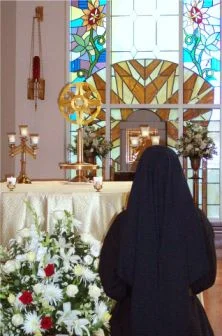
We continually find that our Passionist charism and contemplative way of life is not well known. Even though our religious Institute has been in existence since 1771, the good news about the cloistered Passionist vocation still remains somewhat hidden in the shadow of the cross, and there are strange ideas often floating around about it.
This has prompted us to start a column here that will address these issues while shedding light on many others. Hopefully, you will enjoy learning a little more about Passionist Nuns! As a good friend of ours (a retired Air Force pilot) would say: "Strap yourselves in, because we are ready to fly over all this information!"
And 'fly over it' we will, as we merely touch on various aspects of our way of life. It would take more than a whole library to tell the full story of our beautiful Passionist vocation!
Young people who are more familiar with cloistered Nuns of other traditions, are often confused about the cloister of Passionist Nuns. They do not realize that within the Church there are different types of cloister. All are to be given equal respect and merit, because they are approved and blessed by the Church.
Our religious habit is an outward sign of our consecration to Jesus in the mystery of His Passion and death. It consists of a simple, long black tunic, pleated at the waist by a leather belt from which hangs the rosary of Our Blessed Mother. Over our hearts we wear the Passion Sign which sums up the basic elements of our Passionist spirituality. We wear a simple coif under our black veil.
The religious vows are to be seen as a unity. They are our marriage covenant with the Lamb, in response to His choice and call. We give ourselves to God in Jesus Christ, desiring to love Him in an undivided way. What makes us different from every other order of cloistered Nuns in the Church is what we call our “Passion Vow.”
Just as Christ’s Real Presence in the Holy Eucharist stands at the center of the Church’s life, so too is Our Eucharistic Lord at the center of the life of our community. The Holy Eucharist is truly the source and summit of our daily life and of the interior prayer life of each of our Nuns.
Cloistered Passionist life is a profoundly liturgical life. In addition to daily Mass, we pray the full Liturgy of the Hours, which extends the fruits of the Mass throughout the entire day. This schedule of daily prayer in common forms the “backbone” of our daily life, or to use a musical term, establishes its “rhythm”.
Our Blessed Mother’s continual guiding presence marked the beginnings of the Passionist Congregation. Our tradition has it that she made known to our Holy Founder, St. Paul of the Cross, the mission God had assigned to him. St. Paul of the Cross honored Mary particularly under the titles of Our Mother of Sorrows, and Our Mother of Holy Hope.
The Catholic Catechism says that “taking up one’s cross each day and following Jesus is the surest way of penance.” We express this interior penance in the traditional ways of fasting, prayer and works of mercy. The first thing any Christian must “fast” from is sin. And living closely together in community provides countless opportunities to show mercy in seen and unseen ways.
As one officially enters the novitiate, to receive a name in the context of one’s new state in life as a person preparing for consecration to God as a religious. Religious consecration itself intensifies our baptismal consecration and unites us to the mystery and mission of the Church in a special way.










The ‘Passion Sign’ was given to us by our Holy Founder, St. Paul of the Cross, who described how in a vision he saw Mary, the Mother of Jesus, dressed in black with a badge over her heart. He understood that he was to found a Religious Family that would be clothed in the same manner and wear that special badge. That badge developed into the ‘Passion Sign’ as we know it today.